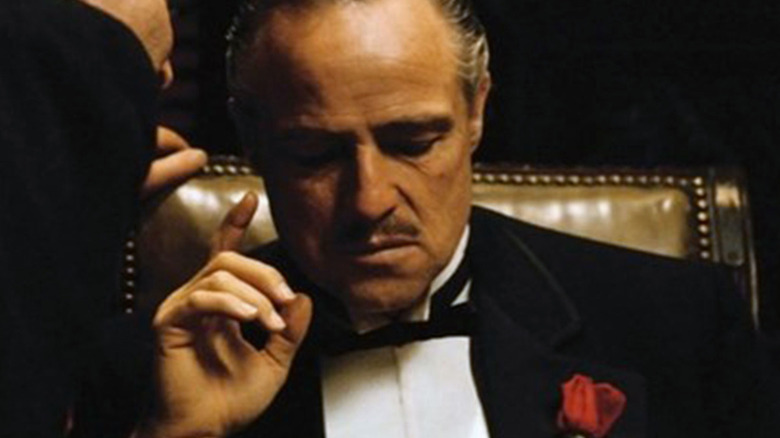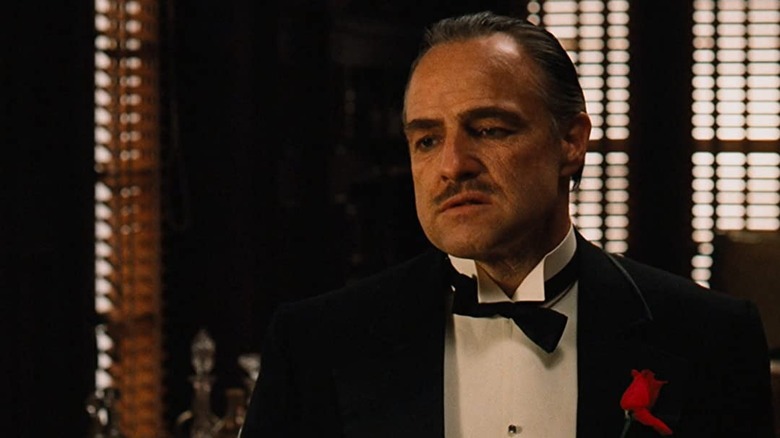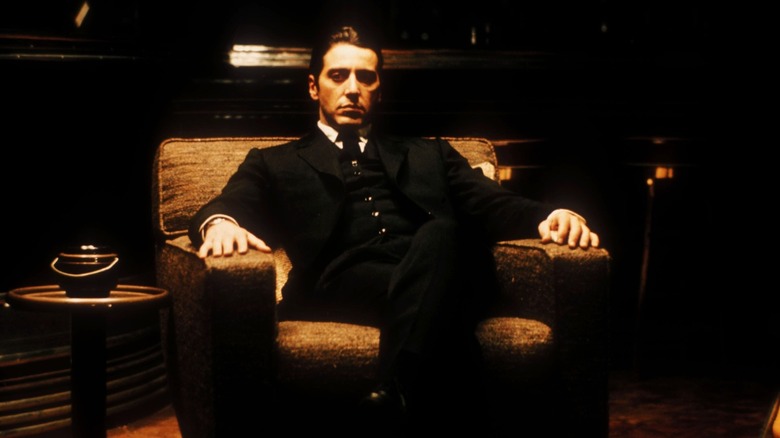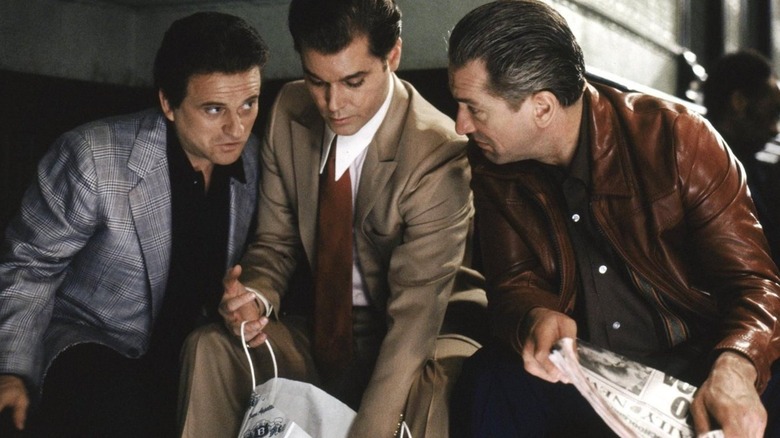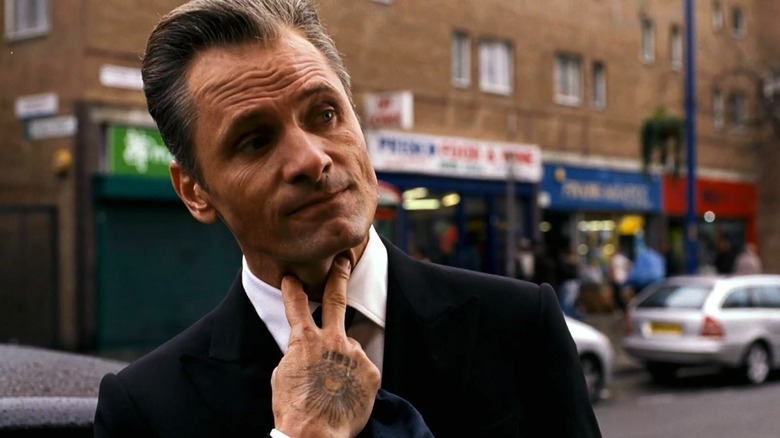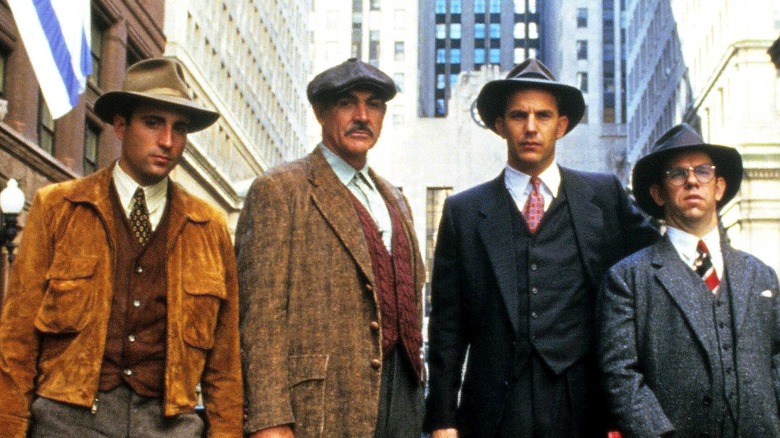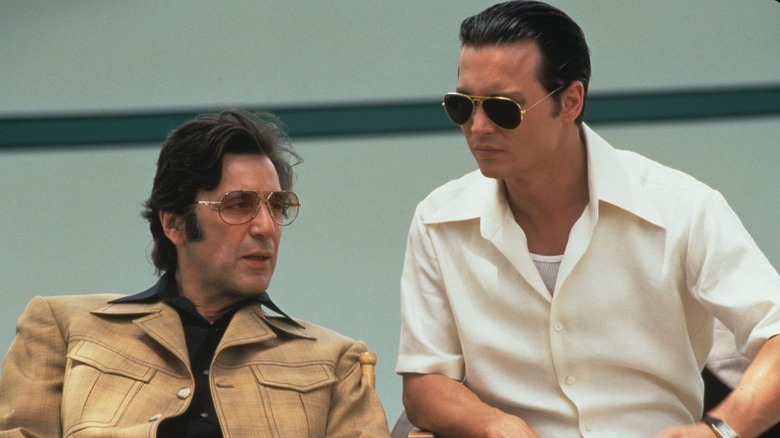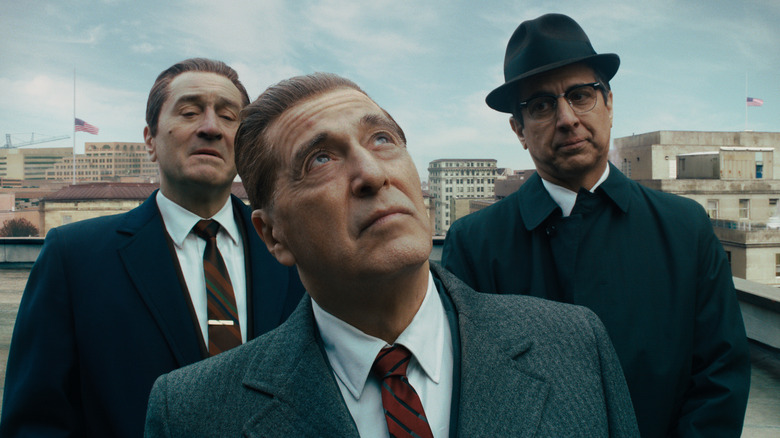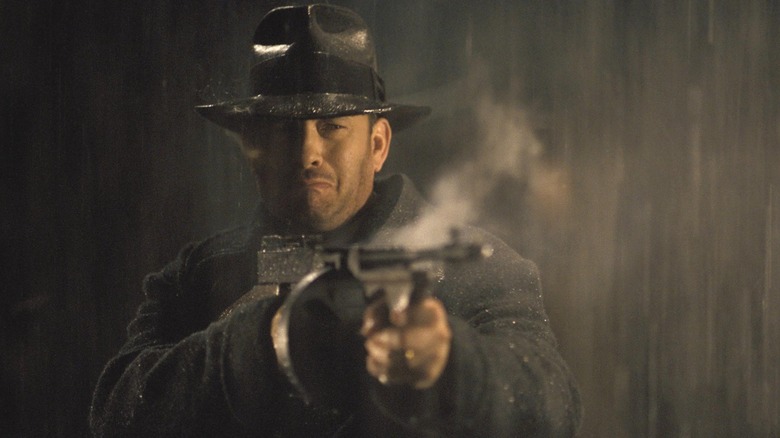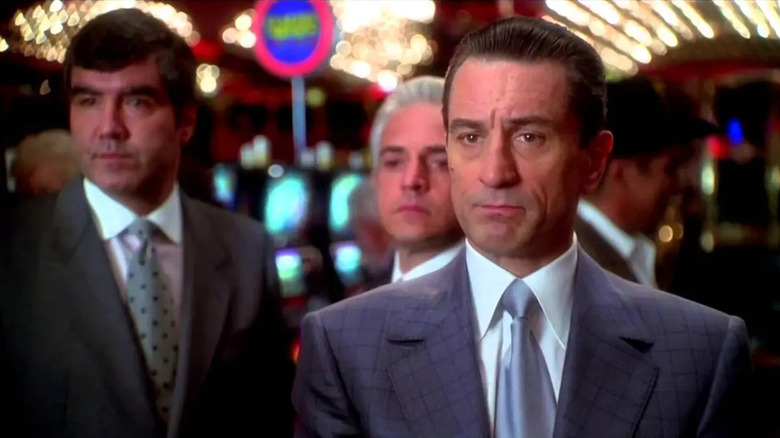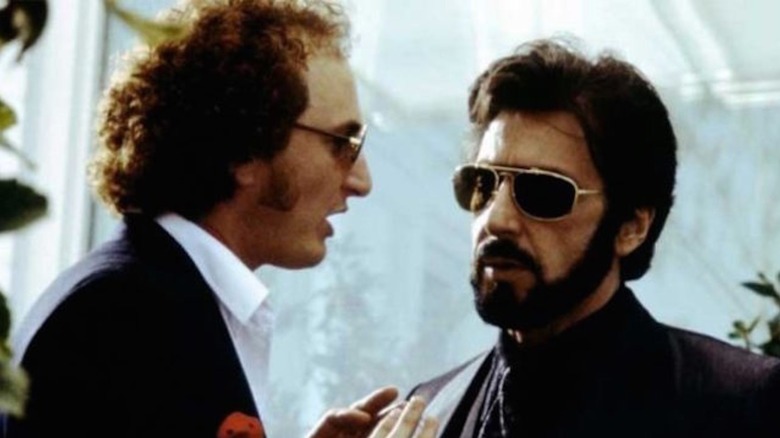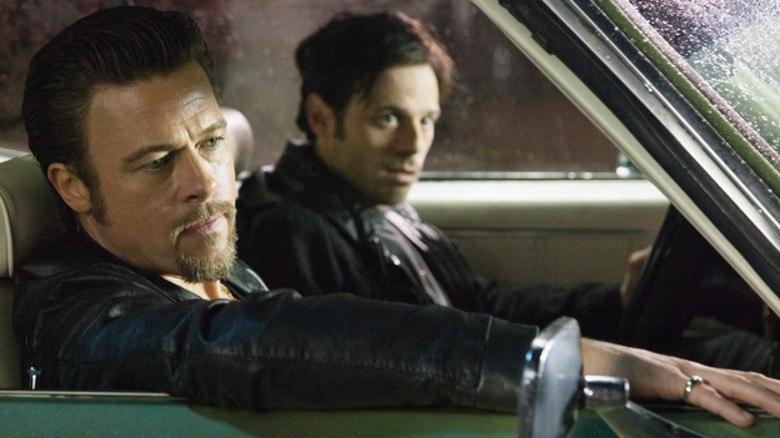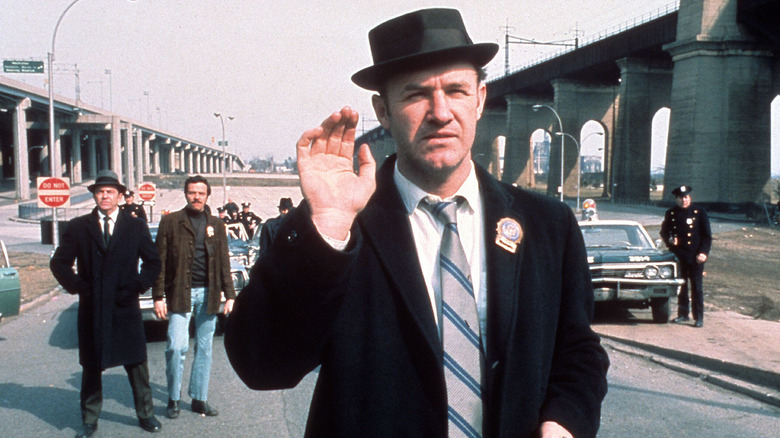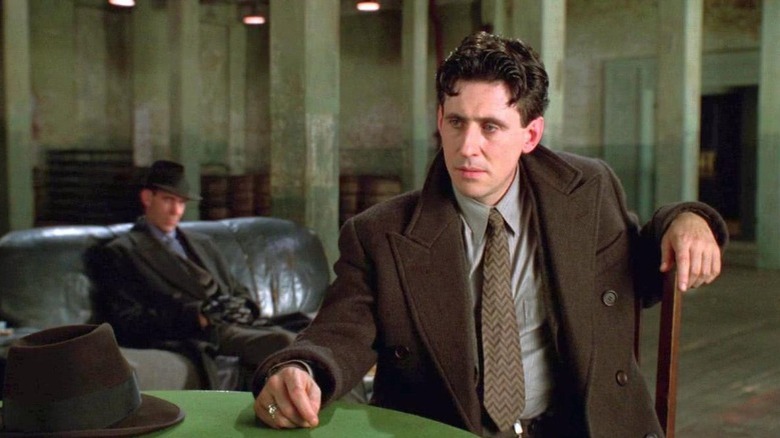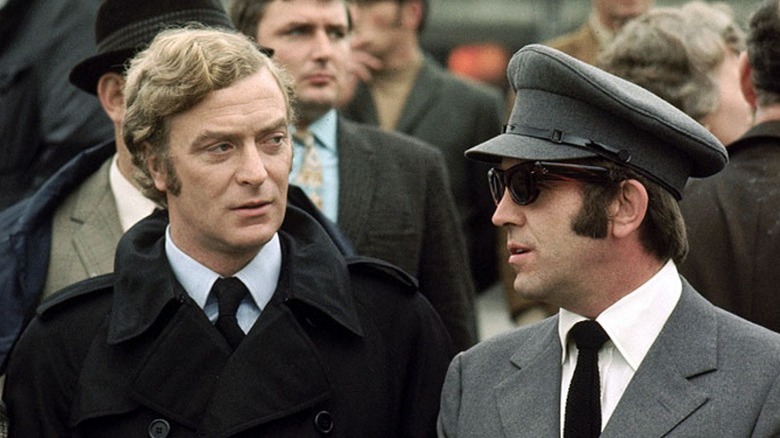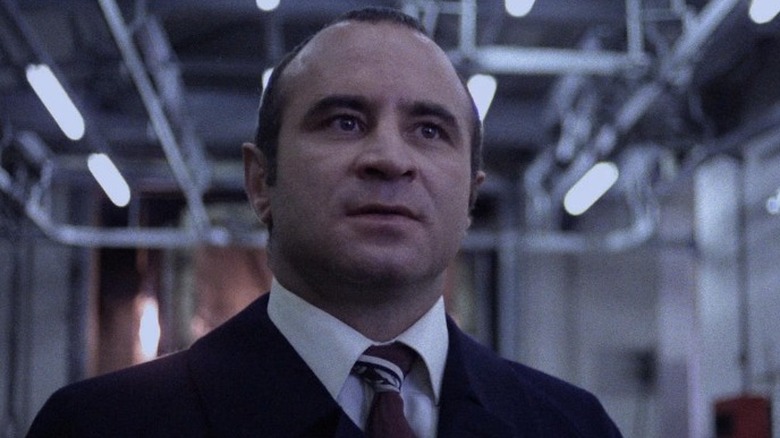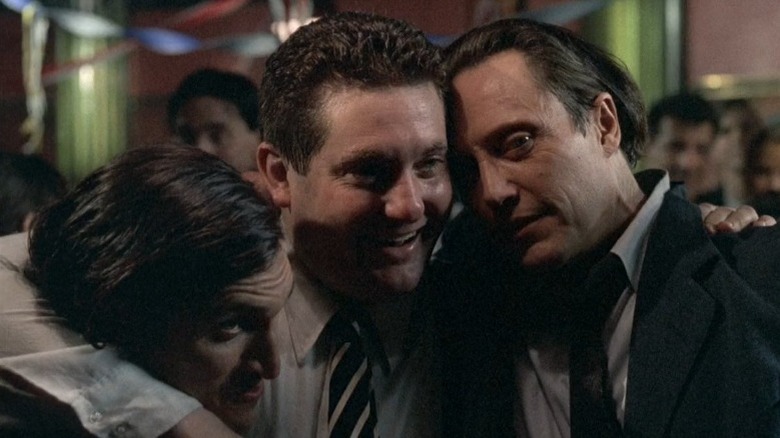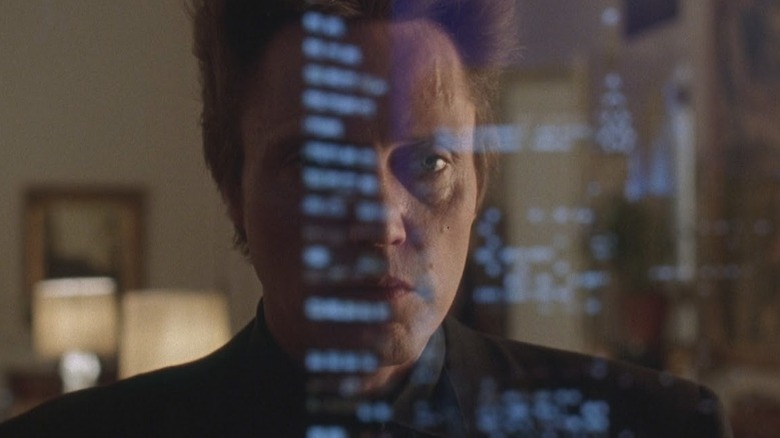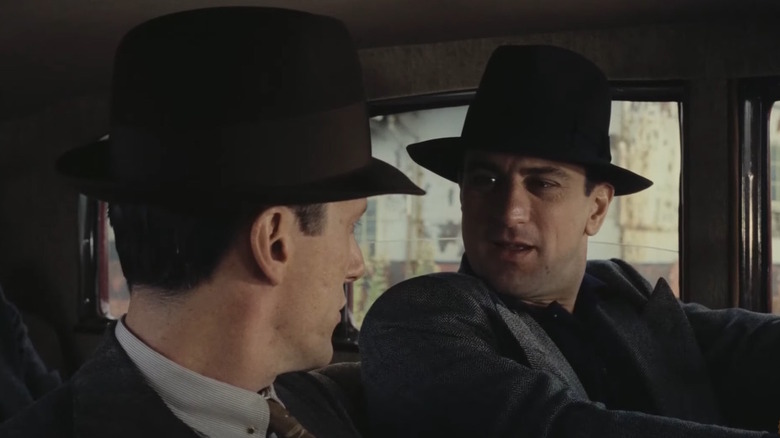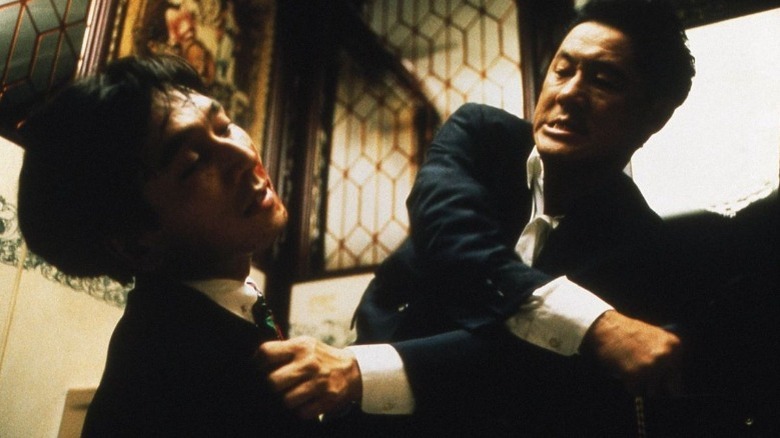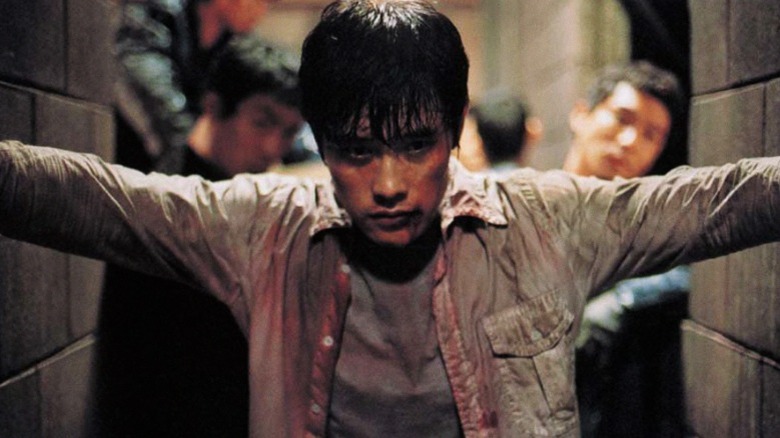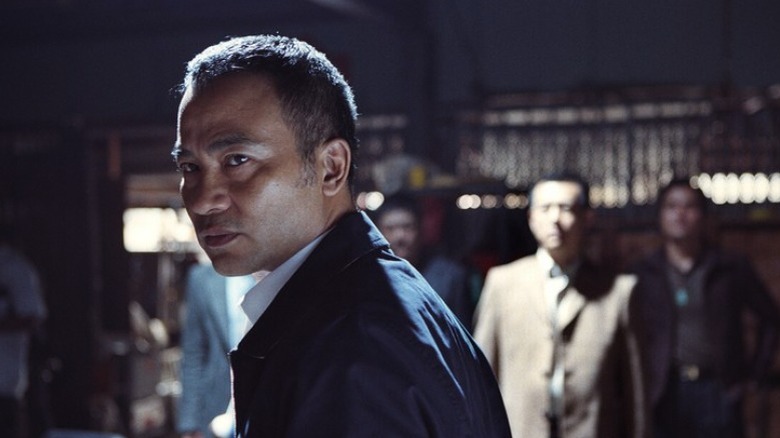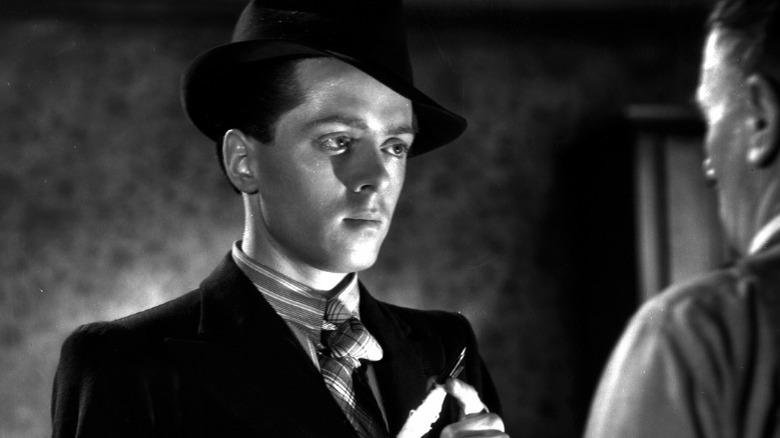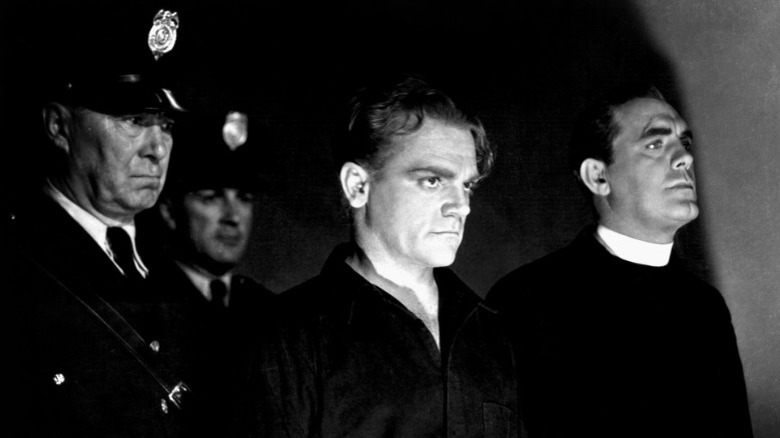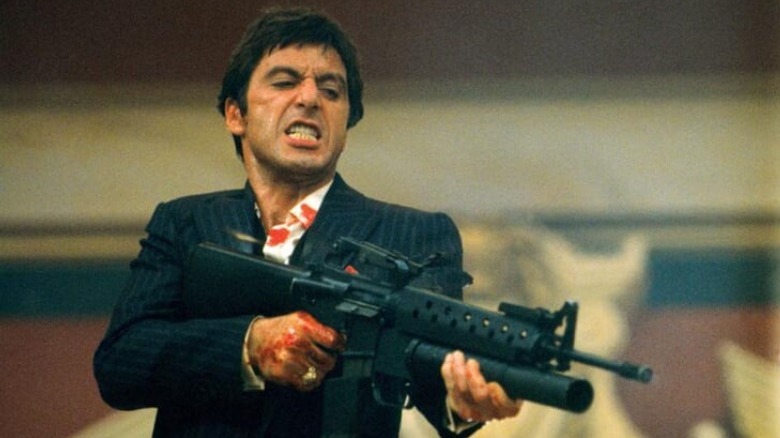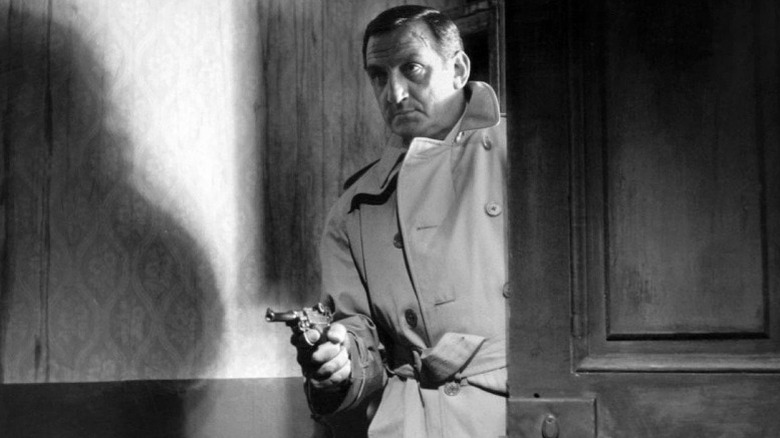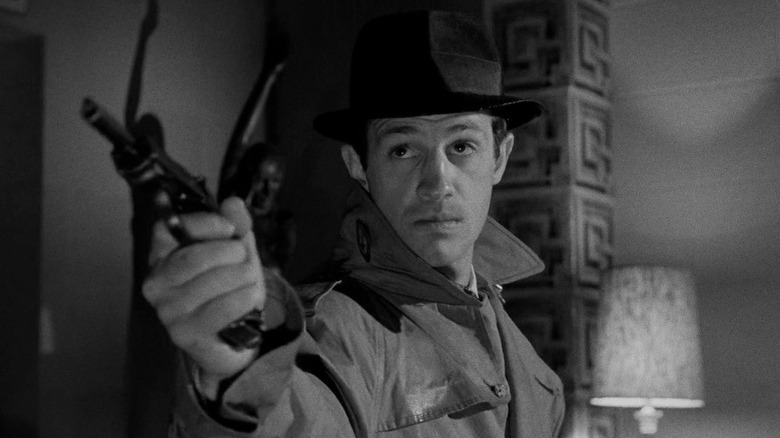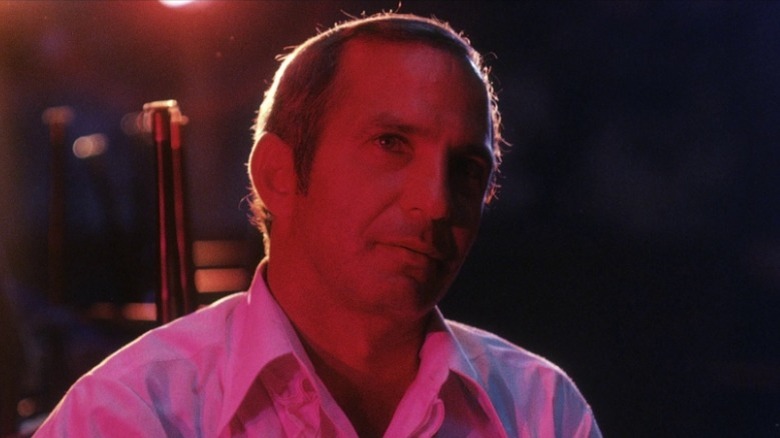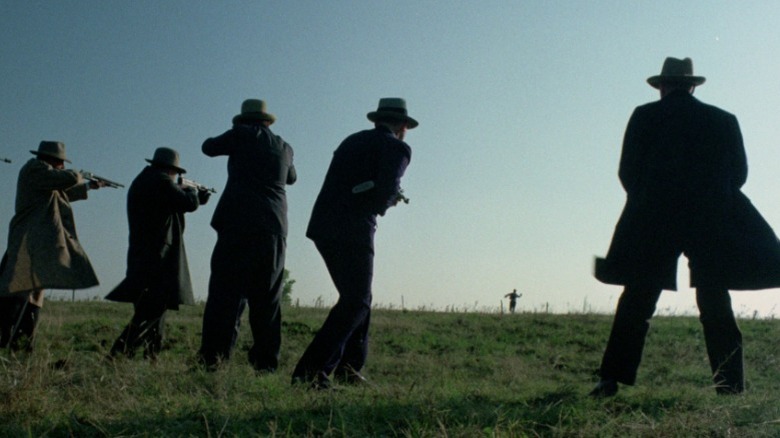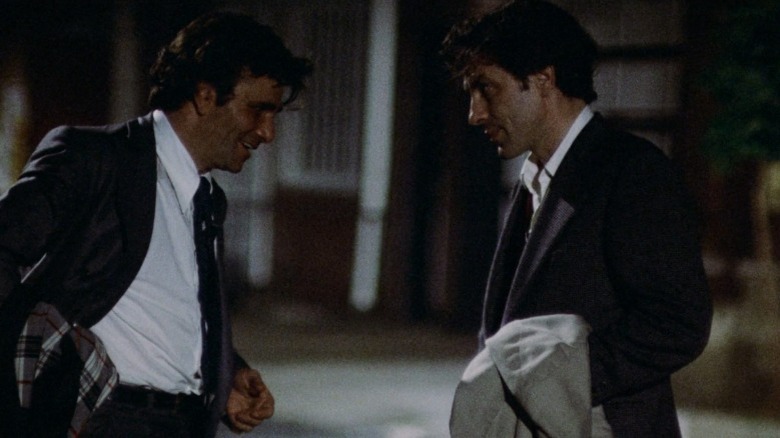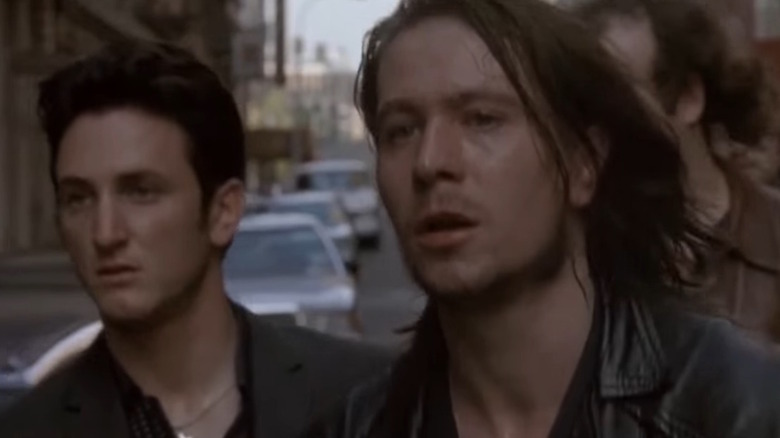The 30 Best Mob Movies You Need To See Immediately
Mob movies are a popular subgenre of crime cinema that centers around the world of gangster organizations and their operations, and often shed light on the dangerous lifestyles of morally complex characters. Although the genre is commonly associated with the notion of the American mafia, there's a diversity within the protagonists of these films. Mob movies focus on different ethnic groups and their criminal organization, and there's a broad range of international favorites that stand alongside the American classics.
Each generation seems to have its own era of great mob movies, and the perceptions of what the mafia's role is have changed along with the culture. The exciting world has fascinated moviegoers since the 1930s, where films like "Scarface" and "The Public Enemy" shocked the general public with their bleak subject material. Many of the mob movies released in the decades since are now known as classics, and several are rated among the greatest films ever.
Some mob movies are more character-based, while others are heavier on their action sequences. Narrowing down the entire history of the genre is no easy task, and many great films, unfortunately, had to be left off the list. However, any cinephile interested in hitting the classics needs to see these mob movies.
The Godfather
If you ask any film professor about the most essential films of all time, chances are "The Godfather" is near the top. Often cited as the best film of all time (alongside "Citizen Kane"), Francis Ford Coppola's 1972 gangster epic changed the way the mob was depicted forever. Adapting the pulpy material of Mario Puzo's popular novel, Coppola crafted an epic American tragedy about family dynamics and the faded illusions of the "American Dream." The film celebrates its 50th anniversary in March, and it's still just as haunting, entertaining, and thoroughly impactful as it was upon release.
"The Godfather" features one of the greatest film ensembles ever. Mafia patriarch Vito Corleone (Marlon Brando) prepares for the upcoming wedding of his daughter Connie (Talia Shire) to Carlo (Gianni Russo) while navigating his relationship with the other mafia families. Vito seeks a closer relationship with his son, Michael (Al Pacino), who remains a relative outsider in the family having served in the war. While Vito loves his wild son, Sonny (James Caan), and his adopted child and business manager, Tommy Hagen (Robert Duvall), he sees Michael as his true heir. When Vito is injured in a botched assassination attempt, Michael is forced to take control of the Corleone family business. He begins his transformation into a ruthless gangster like his father, learning that he values family loyalty above any other thing.
The Godfather: Part II
Truly great movie sequels are relatively rare, and the expectations are intensified if a film is following up a beloved classic. The number of sequels to all-time great films that manage to stand alongside, or even surpass, their originals is a rare group; films like "The Empire Strikes Back," "The Dark Knight," "Aliens," "Lord of the Rings: The Two Towers," "Terminator 2: Judgment Day," and "Mad Max 2: The Road Warrior" are all contenders.
However, no sequel completes the saga while providing insight on past events quite like "The Godfather: Part II." Coppola's epic continuation of the Corleone family saga is both a continuation of the story and a window into the past; the film serves as both a sequel and prequel to the 1972 original, telling the intertwined stories of Michael Corleone's expansions of the family business and the journey of a young Vito (Robert De Niro) as he immigrated to the United States from Italy.
Over an epic 200 minutes, Coppola continues his commentary on the faded illusions of the American Dream by showing the corruption of two generations of men who both initially believe they are doing the right thing. Michael sees himself as protecting his family and ensuring their future, but he's haunted by the lie he told to his wife Kay (Diane Keaton) at the end of the first film. Vito enters the new country with hopes of building a better life, but he begins to build his crime family empire.
Goodfellas
Martin Scorsese is an instrumental figure within the mob movie genre, and many of the modern perceptions of what constitutes a great gangster movie can be traced back to the advances that Scorsese made within the genre. Scorsese has often returned to the mob movie world; he first gained his reputation as a great filmmaker with "Mean Streets," and received some of the greatest accolades of his career with "The Departed." However, no Scorsese gangster movie is quite as iconic as "Goodfellas." Another classic that hasn't aged a day, "Goodfellas" explores the life of a young boy as he's drawn into the seductive mafia world and watches it transform his life.
Henry Hill (Ray Liotta, played in childhood scenes by Christopher Serrone) reflects that "As far back as I can remember, I always wanted to be a gangster." As a young child growing up on the streets of Brooklyn, Henry begins skipping school to work jobs for local gangsters, and he's taken under the wing of the eccentric Tommy DeVito (Joe Pesci) and powerful Jimmy Conway (Robert De Niro). Henry grows into an elite member of their family; outside of their business of shipping illegal substances, the mob celebrates every weekend and holiday together with their families. When Henry falls in love with Karen Hill (Lorraine Bracco), she also gets entrenched within the culture.
The stakes are dramatic, but Scorsese incorporates a lot of humor within the film. However, he doesn't absolve the characters of their crimes, as they face dire consequences.
Eastern Promises
Although many of the most famous mafia movies of all-time center on the American mob, David Cronenberg's 2007 epic "Eastern Promises" sheds a light on the elusive world of the Russian mob and the attempts by British espionage agents to infiltrate that tightly wound business. Cronenberg's family saga is an epic tragedy that features not one, but two of the most effective plot twists in mob movie history. It was able to show a range of perspectives on the mob world by following both insider and outsider perspectives.
British midwife Anya Ivanovna Khitrova lives with her parents in London as she contemplates her recent marriage. While working an overnight shift, Anya tries to save the life of the 14-year-old prostitute Tatiana (Sarah-Jeanne Labrosse). While the girl dies, Anya is able to save her infant child and uncover her secret diary. Seeking a translation of the text, Anya finds the seemingly friendly shopkeeper Semyon (Armin Mueller-Stahl), not realizing he is head of a Russian mafia family. Semyon's enforcer Nikolai Luzhin (Viggo Mortensen) befriends Anya and attempts to protect her as he rises within the family. Semyon has faith in Nikolai, as his own son Krill (Vincent Cassell) is irresponsible and not suited for leadership. Krill sees Nikolai as a friend, but fears that his father will not make him his heir.
"Eastern Promise" slowly reveals its twists, but it also features truly disturbing moments of violence. Nikolai's big bathroom brawl, in particular, is a shocking and brutal fight.
The Untouchables
There's a fear that sometimes mafia films can try too hard to humanize gangster characters, and as a result the audience may end up sympathizing with violent men who have done truly horrible things. However, some of the best mob movies are those that focus on the law enforcement officers that attempt to bring these dangerous criminals to justice. Based on the 1957 novel of the same name, Brian de Palma's 1987 classic "The Untouchables" tells the true story of the Chicago cops that brought down the notorious Al Capone (Robert De Niro). De Palma has experience working in the horror and thriller genres, and here he combines flashy stylistic flourishes with a more classic version of the old-school gangster epic.
A tragic bombing claims the life of a young girl and intensifies the public pressure to put and to violence on the streets of Chicago. The Bureau of Prohibition agent Eliot Ness (Kevin Costner) launches an investigation into Capone, but he's deceived and publicly humiliated when a shipment he thought contained alcoholic beverages is just filled with umbrellas. Eliot is approached by the mother of the girl that was killed, inspiring him to put together a crack squad of elite cops to track down Capone. He enlists veteran cop Jim Malone (Sean Connery), cocky young marksman George Stone (Andy Garcia), and the analyst Oscar Wallace (Charles Martin Smith). The film focuses on the different practices of these men and how they bond over their investigation.
Donnie Brasco
While you might not initially think of the mob movie genre as one that can be emotionally impactful, truly great mafia films can find the essence of human tragedy within a violent world without descending into melodrama. Gangster characters don't always relate their feelings well and are often characterized as hyper-masculine, but that doesn't mean that they are emotionless. 1997's "Donnie Brasco" is a thrilling undercover thriller, but it's also a deeply heartbreaking film about a man trapped between two worlds. Based on a true story, the film follows FBI agent Joe Pistone (Johnny Depp) as he goes undercover within the Bonanno crime family in New York City during the 1970s under the alias "Donnie Brasco."
It's challenging for Pistone to establish himself as a believable hoodlum, but he's able to fall under the wing of aging gangster Lefty Ruggiero (Al Pacino) and gain his trust, becoming one of his right-hand men. Lefty begins to not just respect Donnie, but accept him as part of his family, viewing him as a son. It creates a difficult situation for Pistone; he has a rough marriage and struggles to raise his children, and while he doesn't want to get too connected to the men he's charged with bringing down, Lefty is showing him love when no one else would. Depp and Pacino would both later be known for their more over-the-top and eccentric performances, but they both give more emotional performances for a heartbreaking story.
The Irishman
Martin Scorsese returned to the gangster genre in 2019 with the reflective and emotional gangster epic "The Irishman." The film features characters similar to those Scorsese has depicted throughout his career, yet it bears the unique distinction of following them for their entire lives as they begin in prominence only to watch their families slowly dissolve and lose touch. Scorsese utilized groundbreaking computer-generated imagery to digitally de-age (and age-up) his actors in order to show them throughout their lives.
Frank Sheeran (Robert De Niro) is an Irish-American veteran of World War II who works as a union truck driver in Philadelphia in the 1950s. Sheeran begins working for a mafia family fronted by Angelo Bruno (Harvey Keitel) and befriends the gangster Russell Bufalino (Joe Pesci), becoming his close ally. Due to his Irish heritage, it is hard for Sheeran to gain acceptance within the Italian mafia, but Russell works to give him jobs such as contract killing that will raise his prominence within the family. They begin a smuggling operation with Jimmy Hoffa (Al Pacino), head of the International Brotherhood of Teamsters, in order to crush Hoffa's competition.
The tragedy of the film is watching Sheeran grow his family and then watch them pass him by, and all three central performances are very emotional. De Niro tries to connect with his daughter Peggy (Anna Paquin) when she's older, but she remembers how absent he was as a father. Pesci is also remarkably restrained.
Road to Perdition
Sam Mendes's gripping 2002 adaptation of the DC graphic novel by Max Allan Collins and Richard Piers Rayner is an emotional, generational story of the troubled relationship between fathers and sons. It's a tragic depiction of fragile masculinity and how mafia men are forced to give up their sense of family, and the dangers of trying to escape this dangerous lifestyle. It's a gloomy, yet completely gorgeous film featuring incredible cinematography from the late great Conrad L. Hall and one of the best scores of Thomas Newman's career. Mendes crafts a slowly-paced film that can still explode with tension and shocking violence.
Michael Sullivan (Tom Hanks) is one of the top hitmen within the Irish mafia under the boss John Rooney (Paul Newman) in the midst of the Great Depression. Rooney sees Sullivan as a close ally and considers him to be like a son; Rooney's actual son, Connor (Daniel Craig), is a wild and unpredictable hooligan who has only disappointed his father, yet still desperately seeks his approval. Sullivan knows that his violent history would prevent him from ever truly being redeemed, but he wants to save his son Michael Jr. (Tyler Hoechlin) from falling into the same path. He takes his son away from the family business and tries to bond with them, but the father-son duo is pursued by Rooney's forces and the idiosyncratic assassin Harlen Maguire (Jude Law). It ends with a shocking and heartbreaking conclusion on the perpetual state of violence.
Casino
It was certainly a challenge for Martin Scorsese to reapproach the mob movie genre after "Goodfellas" became so iconic, as it would be hard for him to craft another film that could stand up to his instant classic. However, 1995's "Casino" proved itself to be a great mafia movie in its own right. While "Goodfellas" fans will certainly enjoy "Casino" for its similar tone and aptitude for violence and dark humor, the film takes a different approach to the genre and explores the fascinating world of the Las Vegas casino scene. Scorsese is known for his epic runtimes, but "Casino" is so constantly entertaining that the 178-minute runtime simply flies by.
Based on a true story, "Casino" follows the Jewish-American sports handicapper Sam Rosethein (Robert De Niro) when he's sent by the Chicago mob to oversee gambling operations in Las Vegas. Sam arranges for a smuggling of funds to the mafia and the influence of game outcomes. The mob also dispatches made man Nicky Santoro (Joe Pesci) to help protect their operation, and Sam slowly grows accustomed to a life on the fast-paced Vegas scene. He meets a prostitute named Ginger McKenna (Sharon Stone), falls in love with her, and the two marry. However, Ginger is unpredictable and causes unforeseen trouble within Sam's life. He also struggles with the pressure to appease local politicians who have a stake in the games. De Niro gives a steely performance, and Pesci has a blast as an eccentric loudmouth character.
Carlito's Way
Brian De Palma always creates an interesting tone with his crime films, which combine well developed characters with more elaborate stylistic flourishes. "Carlito's Way" is a fascinating look at a gangster's career that features one of Al Pacino's best performances ever; Pacino is known for giving exaggerated performances and can often be quite hammy, but he's remarkably restrained here in his role as Puerto Rican gangster Carlito Brigante. There are obvious similarities within De Palma and Pacino's other famous collaboration, 1983's "Scarface," but "Carlito's Way" is the stronger film.
Carlito has lived a life of violence and decides to go straight and retire to the Caribbean with his girlfriend Gail (Penelope Ann Miller). Carlito's best friend and closest accomplice is his lawyer, David Kleinfeld (Sean Penn), a wild man who's addicted to drugs and prone to shocking bits of rage. Carlito's attempts to escape are threatened by the competition of the Italian mafia, and David's obnoxious behavior causes conflict with Bronx gangsters.
Killing Them Softly
Occasionally a new film will establish itself as a future classic worthy of becoming an all-time great, and Andrew Dominik's experimental 2012 mafia film "Killing Them Softly" is a film that could only exist within the 21st Century. Set amidst the backdrop of the Presidential Election and American financial crisis of 2008, the film explores how the robbery of a mob fronted card game causes a string of events that disrupt the ecosystem of the mafia. It's a film that gradually shows the ripple down impact of one crime.
Markie Trattman (Ray Liotta) runs a series of card games, but the mafia keeps a close eye on him due to a past false robbery that he staged. Markie is disturbed when the robbers Frankie (Scoot McNairy) and Russell (Ben Mendelsohn) rob his game, as he fears he'll be accused of setting them up. The mafia sends hitmen Jackie (Brad Pitt) and Mickey (James Gandolfini) to take out Markie, Frankie, and Russell. Jackie and Mickey share a brief, heartbreaking conversation when Mickey becomes aware he's going to have to serve time.
The French Connection
1971's "The French Connection" isn't only one of the most essential mafia films ever made, but one of the most beloved action films, as well. The remarkable car chase sequences are among the best ever filmed, and the film tells an electric story of an investigation that more than justifies the exciting setpieces. Director William Friedkin creates a film with almost documentary-esque precision, following the cops as they piece together clues about a French heroin operation that is taking over New York.
Gene Hackman delivers one of the best performances of his career as NYPD Detective Jimmy Doyle, who teams up with fellow officer Buddy Russo (Roy Scheider) to track down the chief French smuggler Alain Charnier (Fernando Rey). Charnier plans to bring a massive shipment onto the coast within two weeks, and both Jimmy and Buddy know it gives them a strict timeline to stop the sale before a new wave of narcotics takes over New York. It becomes a personal vendetta for Jimmy as Chanier eludes his pursuits; Rey creates a detestable screen villain.
Miller's Crossing
A loving homage to the gangster films of the 1930s, the Coen brothers' "Miller's Crossing" is a densely layered genre masterpiece. Lifting plot elements from two Dashiell Hammett novels ("The Glass Key" and "The Red Harvest"), it has a notoriously labyrinthine plot — one the Coens struggled with so much that they ended up writing "Barton Fink" as a result of their writer's block.
Gabriel Byrne gives a career-best performance as the laconic Tom Reagan ("the man who walks behind the man, and whispers in his ear"), confidante to Irish Mob boss Leo O'Bannon (Albert Finney). Alternating between scheming, gambling, and getting beaten up, Tom's true allegiance remains murky right up to the film's final moments, and even then, that last shot remains vaguely enigmatic. Every performance is pitch perfect, but Jon Polito and J.E. Freeman stand out as the hot-headed Johnny Caspar and his grim right-hand man, "The Dane." John Turturro is also incredible as the weaselly Bernie Bernbaum, a negative reflection of Tom's duplicitous nature.
The Coens employ an idiosyncratic vernacular for the gangsters in one of the most lyrical, memorable scripts they have ever written. An incredibly game cast delivers the rich, convoluted dialogue naturally without it ever seeming mannered. The visual of Leo wielding a Tommy gun in his dressing gown, beautifully scored to a gramophone recording of "Danny Boy," might be the single most memorable sequence in the Coens' entire filmography. Equally, Bernie's fateful walk into the woods is a masterclass in wringing as much pathos as possible out of a single repeated phrase, "Look in your heart."
Get Carter
The late great Mike Hodges' masterpiece, "Get Carter," might be the best British gangster film ever. Giving one of his most impressive, nuanced performances, Michael Caine plays Jack Carter, a cold-blooded London gangster who returns to his hometown of Newcastle in the wake of his brother's death. Upon arrival, he immediately sets to work, questioning old acquaintances to learn exactly what happened and exacting his revenge on those involved.
After making a name for himself playing cheerful, cocky characters, Caine is positively reptilian as Carter. He's measured and controlled in his actions and effortlessly intimidating, with a barely concealed snarl of contempt fixed on his face. He plays the character with a grim determination and without a shred of humor. For Caine, this was intentional as a way to take on more challenging roles. Having a personal connection with the part, Caine stated, "In English movies, gangsters were either stupid or funny. I wanted to show that they're neither."
Hodges makes evocative use of location, showing a city in decline. The dilapidated landscape and the emerging modern, garish architecture are shown as physical manifestations of a city corrupted by the seedy underworld of drugs, pornography, and gambling. A lean, nihilistic revenge thriller, "Get Carter" is a brutal film without a wasted line of dialogue and a characteristically British streak of dark humor.
The Long Good Friday
"The Long Good Friday" is a sparse, intensely cool film that unfolds with an elegant economy. Poor London Mob boss Harold Shand (Bob Hoskins) genuinely wants to go straight. Having presided over 10 years of peace among the London gangs, he is making the final preparations to launch a legitimate business venture with his American partners when his gang is hit by a series of random attacks.
Hoskins gives a natural, instinctive performance, showing Harold's cocksure bravado but also the subtler aspects of his character (like his preoccupation with class and the inner turmoil over the death of his closest friend) without ever overdoing it. Harold is strong-willed and charismatic but also brutish and possessed of a violent temper, as demonstrated when he glasses a treacherous subordinate in the throat. He's also woefully ill-equipped to deal with the emerging threat of the I.R.A. Hoskins perfectly portrays this confusion of dealing with an adversary who can't be threatened or negotiated with.
There are a handful of iconic set pieces, including the scene where Harold rounds up all the London bosses and hangs them upside down in a slaughterhouse and his speech to the American gangsters. The final scene, in which Harold is abducted by a fresh-faced Pierce Brosnan, is one of the best examples of non-verbal acting in genre cinema. Hoskins beautifully conveys his character's thought process and nails each emotion without uttering a single word.
The Funeral
An underseen masterpiece, Abel Ferrara's "The Funeral" is one of the bleakest films on this list. Unapologetically grim, it opens with the funeral of the murdered Johnny Tempio (Vincent Gallo), the youngest brother of the Tempio crime family. The rest of the film follows his siblings Ray (Christopher Walken) and Chez (Chris Penn) as they hunt for the man who killed their brother and struggle to cope with their grief.
Unfolding predominantly in flashbacks as the family reminisces about happier times, we see the growing tensions that ultimately lead to Johnny's death. Nicholas St. John's thematically dense script is full of religious symbolism and theology but largely avoids sounding preachy or didactic. Instead, "The Funeral" emerges as a thought-provoking take on the Mafia's paradoxical relationship with Catholicism.
Walken gives an uncharacteristically understated performance, and his final confrontation with his brother's murderer is a bleak rejoinder to the redemptive ending of Ferrara's "Bad Lieutenant." There are powerful performances from the entire cast, which includes Benicio Del Toro, Isabella Rossellini, and the phenomenal Annabella Sciorra as Ray's world-weary wife.
However, Chris Penn steals the film as the emotionally stunted Chez. Alternately monstrous and vulnerable, he carries an overwhelming sadness on his shoulders that goes beyond grief, and the scene where he pays a young girl for her soul is appropriately terrifying. Chez is a horrific creation, but Penn makes him all too human. If we hate Chez, that's nothing compared to how he feels about himself.
King Of New York
Probably Abel Ferrara's most mainstream film, "King Of New York" is woefully underrated. An atmospheric, hyper-violent gangster noir, it boasts what might be Christopher Walken's finest film performance as drug lord Frank White. Newly released from prison, White immediately sets to work eliminating his rivals in the Italian, Colombian, and Chinese gangs, establishing himself as the titular King Of New York. The entire film can be summed up in the visually arresting image of White's face looking out his hotel window. Taking in the breadth of his domain, the lights of the city landscape are reflected in the glass. This is his city.
Yet, White isn't your standard Mob boss. Scenes in the seedy underworld are constantly contrasted with uptown dinner scenes, showing Frank mixing with the wealthy elite. He inhabits both worlds equally and isn't afraid to get his hands dirty, taking out the Italian Mob boss and personally leading the attack on the Chinese gangsters.
Walken is incredible, delivering all his lines with his distinctive cadence and intensity, and Laurence Fishburne is a lot of fun as White's chief henchman. Victor Argo, Wesley Snipes, and David Caruso make for an eclectic bunch of cops, showing the full breadth of the law's contempt for White. Argo's detective Bishop is intent on catching him the right way, while the more impulsive Gilley (Caruso) has a more fluid definition of the right way. This leads to the explosive climax as the detectives take the law into their own hands.
Once Upon A Time In America
At over three hours long, "Once Upon A Time In America" is a genuine gangster epic. Sergio Leone's most ambitious film is a sweeping narrative with beautiful cinematography and a truly evocative score from Ennio Morricone. Yet, it never made the same cultural impact as the superficially similar "The Godfather" or "Goodfellas." This may be due to the horrendous cuts made ahead of its original release or because of the extremely unsympathetic characters.
Robert DeNiro plays a very different kind of gangster compared to the charming Jimmy Conway of "Goodfellas" or the principled Vito Corleone of "The Godfather Part II." David "Noodles" Aaronson is quiet and thoughtful, leading you to believe he's halfway decent until he's revealed to be truly monstrous. He and the rest of the gang are utterly reprehensible, and yet, as Quentin Tarantino puts it, "The weight of what they're doing never rests completely in your heart." Indeed, it's telling that despite Noodles' abhorrent actions, the cultivated Max (James Woods) is portrayed as the worse of the two. Themes of loyalty and friendship permeate the film, and despite the numerous transgressions committed by the gang, for Leone, personal betrayals matter most.
DeNiro and Woods inhabit their roles beautifully, and the whole film is peppered with vivid character sketches from the likes of Joe Pesci, Richard Bright, and Burt Young. Depicting beauty and brutality in epic proportion, Leone constructs the film meticulously, using iconic imagery and a non-linear, almost ethereal, narrative to create a mesmerizing masterpiece.
Sonatine
More closely resembling something from the French New Wave than a traditional Yakuza movie, "Sonatine" is perhaps the quintessential Takeshi Kitano film. It's filled with the tropes and themes that characterize his work: non-linear editing, jump cuts, beach locations, Hawaiian shirts, and shocking bursts of violence. Kitano, who also stars in the film, gives a stoic performance as Murakawa, a volatile but increasingly burnt-out Yakuza working in Tokyo. When he and his gang are sent to Okinawa to settle a dispute, most of his men are massacred, and the survivors are forced to hide out at the beach to regroup and plan their next move.
"Sonatine" is a simultaneously playful and fatalistic film in which death is never far away. Murakawa is weary of the Yakuza lifestyle, and the film is suffused with his recurring thoughts of death, leading to the iconic scene where he daydreams about shooting himself in a game of Russian roulette. Confronted by his mortality, Murakawa distracts himself by playing childish games on the beach with his subordinates.
The film culminates in a visually striking showdown where Murakawa confronts the gangsters who set him up. In an apparent homage to "The Public Enemy," the shootout is only shown in brief glimpses, while the dark office is shot from a distance, only lit by the bursts of machine gun fire. A ruminative, philosophical film, "Sonatine" reflected Kitano's nihilistic worldview at the time, paralleling his real-life scooter accident, a subject he would return to in his later film "Hana-Bi."
A Bittersweet Life
Kim Jee-woon's revenge thriller, "A Bittersweet Life," is a great cautionary tale about the perils of being seduced by the gangster lifestyle. Lee Byung-hun plays Sun-woo, a hotel manager who moonlights as a Mob enforcer. Fastidious and immaculately dressed, he takes pride in his work and has a good relationship with gangster boss Mr. Kang (Kim Yeong-cheol). Assigned to watch over Kang's mistress, Hee-soo (Shin Min-a), while he's away, Sun-woo discovers her having an affair, but his complicated feelings for her prevent him from reporting it, leading to an abrupt fall from grace.
While Sun-woo diligently works for the Mob, he isn't a gangster himself, even though he aspires to be, emulating Christopher Walken in "King Of New York" as he gazes at the cityscape. Other gangster characters commit more significant transgressions, but because they are connected, they are quickly forgiven. Sun-Woo has no such connections, so when he finds himself out of favor with the boss, he is on his own and is forced to rely on his wits to survive.
"A Bittersweet Life" is a slick, stylish revenge thriller with a colorful rogues gallery of villains, each of whom has a moment to shine. The scene where both Sun-woo and a villain race to assemble their guns is a stand-out, as is the explosive finale in which all debts are settled in a brutal shootout.
Election 1 and 2
Although his work is often compared to fellow Hong Kong action director John Woo, Johnnie To's films are very different. He has a measured, understated directing style reminiscent of the existential gangster films of Jean Pierre Melville. His two-part gangster epic, "Election," is his crowning glory. The film follows the traditions of the Triad society as a crime syndicate elects two new chairmen. Simon Yam gives a masterclass in understatement as the heir apparent to the Triads. He is calm, measured, and unflappable — the polar opposite of his impulsive, quick-tempered chief rival (Tony Leung Ka-Fai). The first film shows the ascent of both men as they send their henchmen to retrieve a ceremonial baton. The second film follows the incumbent chairman as he attempts to buck tradition and cling to power, regardless of the consequences.
To's films are notable for their relative calmness and the mundanity of the Triads. It shows how organized crime in Hong Kong mostly revolves around old men sitting in dingy backrooms. The gangsters are generally presented as decent soldiers just doing their jobs, with no animosity for one another. That is until "Election 2," in which ambition gets the better of them. Nick Cheung is a standout as the taciturn enforcer Jet, who gets a raw deal in both films and walks away without a backward glance.
The final scene of the first film remains one of the most shocking heel turns in any gangster film and a timely reminder that however reasonable these characters appear, they will do anything to retain their wealth and position.
Brighton Rock
One of the few times Richard Attenborough was truly menacing onscreen, his turn as Pinkie Brown in this adaptation of Graham Greene's classic crime novel "Brighton Rock" is utterly chilling. Set in the seaside town of Brighton, the film is the story of Pinkie, a juvenile psychopath devoid of compassion and warmth. When Pinkie murders a journalist in cold blood, he sets in motion a chain of events that leads to his downfall. Complicating matters is Rose (Carol Marsh), a waitress and potential witness, whom Pinkie plans on murdering.
What makes this film more effective than other depictions of youthful gangsters is that despite Pinkie's outwardly disquieting demeanor, he's not some ice-cold gangster prodigy. When the chips are down, and he's confronted by more physically imposing gangsters, his facade crumbles, and he's revealed for who he is — a sniveling, cowardly child.
Compelled by the censors to alter the book's ending, Greene penned a compromise that is possibly more haunting than "the worst horror of all," as stated in the novel. In the film, rather than having Rose listen to the record of Pinkie's hate-filled diatribe, the record gets scratched, so when she goes home and listens to it, it catches on Pinkie's sardonic "I love you," leading her to believe his feelings for her were genuine.
Angels With Dirty Faces
James Cagney made his name with dynamic, charged performances in several pre-code gangster films. "The Public Enemy," "The Roaring Twenties," and "White Heat" are all worth watching, but "Angels With Dirty Faces" is our favorite.
The film follows two childhood friends whose lives take drastically different turns. Jerry (Pat O'Brien) enters the priesthood, while Rocky (Cagney) embarks on a life of crime. Things come to a head when Rocky gains the respect of a gang of juvenile delinquents (the Dead End Kids), whom Jerry is trying to save from going down the same road as his friend. While Jerry tries to set them on the straight and narrow, Rocky undermines him by reveling in their adoration of him as a real-life gangster.
It's a classic film but fairly conventional (albeit with stellar support from Humphrey Bogart as the cowardly villain) until the final scene, where Rocky breaks down on his way to the electric chair, destroying his hero status in the eyes of his admirers. It's one of the most ambiguous endings in classic Hollywood cinema. Is he doing one last favor for his childhood friend, pretending to break down for the sake of the kids' souls? Or is this simply a subtler version of his iconic final line in "The Public Enemy" ("I ain't so tough"), and what we are seeing is a sincere emotional breakdown? Either way, it's an intensely impressive performance from Cagney as he nears hysteria, collapsing and begging for mercy as he is dragged to the chair.
Scarface
It's telling that posters for Brian De Palma's florid remake of Howard Hawks' seminal gangster film adorn the walls of teenagers the world over. More than in any other movie on this list, the characters in "Scarface" are self-consciously styled gangsters, seduced by the gaudy opulence of a life of crime. As Michelle Pfeiffer's Elvira says, "Nothing exceeds like excess," and "Scarface" is an exercise in decadence from its depiction of the vulgar hedonism of the gangster lifestyle to Al Pacino's larger-than-life performance as Tony Montana. Pacino almost defies us to root for the brutish Tony. He's arrogant, crude, and ruthless, but in Pacino's hands, he's also a magnetic, irrepressible character.
De Palma's depiction of gangster life verges parody, but "Scarface" remains a technical marvel of a film. From the infamous chainsaw scene to Tony's magnificent final stand, there are many iconic sequences, but through it all is a fatalism and cynicism that is hard to shake. The American Dream that Tony chases is a fantasy. By the film's conclusion, the world is his, and all he has to show for it is a mountain of white powder and a Colombian hit squad coming for him.
Le deuxième souffle
Jean Pierre Melville is the undisputed master of the existential gangster film. You can trace pretty much every laconic gangster from contemporary crime cinema back to the trenchcoat-clad protagonists of his films. John Woo, Michael Mann, Walter Hill, and Takeshi Kitano all owe a huge debt to Melville.
"Le deuxième souffle" is one of his most successful gangster movies. There is an ineffable code of honor among the mobsters, and an almost feral brutality, too. The main character, Gu (played by Lino Ventura), is a taciturn bulldog of a character, blunt and prone to violence. Yet, he possesses a sense of professional integrity that seems to be absent from the emerging younger generation of criminals. Paul Meurisse nearly steals the film from under Ventura's nose as the cheerfully corrupt police chief Blot. Arriving at a murder scene, he dryly provides a sardonic commentary on how, of course, none of the complicit bystanders could have seen anything — in a five-minute uninterrupted take.
In a film full of iconic moments, the standout scene is indicative of Melville's style. Before a tense meeting, one of the gangsters arrives early and patiently looks for somewhere to hide a gun. He leaves, and seconds later, another gangster arrives, searching the room for hidden weapons. He quickly finds the gun. The subsequent meeting is dripping with tension as we wait for the inevitable grab for the gun, and yet, Melville still manages to surprise the audience.
Le Doulos
"Le Doulos" is possibly Jean Pierre Melville's first wholly successful attempt at a gangster film. The "Le Doulos" of the title refers to a name for an informant, or a "finger man," and a type of fedora worn by most of the characters. Melville was a fan of the film noir style, and he emulates it perfectly, recreating the aesthetic of 1940s cinema through the use of trenchcoats, cigarette smoke, and shadows ... so many shadows. Melville makes strikingly modern use of black and white cinematography, with characters' faces hidden in shadow beneath the brims of their hats. The preoccupation with self-image is a throughline in all of his films, with characters often checking their reflections or adjusting their hats. Melville's characters are all too aware that they are in a film.
The twisting plot of "Le Doulos" does make sense, but it's a lot more fun to just let it wash over you. Jean-Paul Belmondo plays the charming Silien, who is determined to protect the dour Maurice (Serge Reggiani), newly released from prison, from the numerous heavies heading his way. Of course, a series of betrayals and misunderstandings leads Maurice to believe Silien is an informant, setting the scene for a tragic conclusion.
"Le Doulos" is more than just a pastiche. Melville understands the mythic figures of noir better than anyone, exploring ideas of betrayal and the persistent myth of "honor among thieves." In Melville's films, honor is all the characters care about.
The Killing of a Chinese Bookie
John Cassavetes' most accessible film, "The Killing of a Chinese Bookie," was conceived with Martin Scorsese while the two directors were editing "Mean Streets." The film features a wonderfully sleazy turn from Ben Gazzara as Cosmo, a nightclub owner with delusions of grandeur who lands himself in debt with the Mob. When he can't pay up, they coerce him into murdering the titular Chinese bookie to clear his debt.
"The Killing of a Chinese Bookie" is awash in neon lighting and shot with the gritty realism characteristic of all Cassavetes films. Gazzara gives a remarkable performance as a very unremarkable man. He displays his lack of charisma when he tries to work the crowd in his club. However, his instincts kick in when on the hit, and he emerges as a surprisingly adept killer. Timothy Carey, a stalwart of gangster cinema going back to Stanley Kubrick's "The Killing," is electric as the most offbeat and unpredictable of the gangsters, who unaccountably develops a soft spot for Cosmo. It's an improbably touching performance, and he emerges as both the most sinister and likable of the gang. The gangsters are disarming and vaguely comic, but there is a palpable and authentic sense of menace in every interaction.
Dillinger
You can be forgiven for dismissing this gangster biopic from John Milius as one of the many exploitation crime films like "Bloody Mama," "Boxcar Bertha," and "The Grissom Gang" released in the early 1970s. However, "Dillinger" is a cut above these. It's a lean, subversive film that romanticizes its subjects while never shying away from depicting the brutality of the criminal lifestyle.
Warren Oates is a suitably grizzled Dillinger and more convincing as the career criminal than Johnny Depp in "Public Enemies." Unapologetically callous yet undeniably charismatic, Oates doesn't have much physical resemblance to the bank robber (Milius doesn't let the facts get in the way of a good story). Still, the film captures the public perception of him well and features colorful supporting roles for the likes of Harry Dean Stanton, Geoffrey Lewis, and an impossibly young Richard Dreyfuss as the psychopathic Baby Face Nelson.
Responsible for a handful of cult films and some of the most iconic screenplays in film history like "Apocalypse Now," as well as being credited as the author of the Indianapolis speech from "Jaws," Milius is an enigmatic figure in film history. "Dillinger," his directorial debut, might have the feel of a B movie, but it has some exceptional moments and striking shot composition that belies its low-budget aesthetic. The death of Pretty Boy Floyd (Steve Kanaly), for instance, has no business looking as beautiful as it does, and the climactic shootout at the gang's safe house seems like a pared-down Sam Peckinpah set piece.
Mikey And Nicky
It might seem strange to include this comedy-drama, but the consequences of the gangster lifestyle have never been more apparent than in Elaine May's sublime film. Having stolen money from the boss, Nicky (John Cassavetes) is in hot water with the Mob. With a contract out on his life and nowhere else to turn, he goes to his oldest friend, Mikey (Peter Falk), unaware that he has already been ordered to set his friend up to be killed by novice hitman Kinney (Ned Beatty).
Alternating from comedy to tragedy (often within the same scene), May directs with a strikingly light touch. She gives her actors enough space to interact with each other naturally as they effortlessly depict a complex friendship filled with paradoxes. Nicky loves Mikey but constantly uses him and casts him aside because, at his core, he's just incredibly self-centered. Mikey loves Nicky, too, but has had enough of his antics. And there's an element of jealousy over Nicky's natural charm.
Frequent collaborators Falk and Cassavetes have an easy rapport and natural chemistry that brings authenticity to their relationship. They are truthful to each other throughout, even when they are lying. These characters care deeply for each other, but on a purely pragmatic level, Mikey knows that Nicky is a liability that he needs to cut loose. The final scene is incredible. Absurd and genuinely upsetting, it's the only ending the film could have.
State Of Grace
Released the same year as "Goodfellas," Phil Joanou's Irish gangster film is relatively standard fare. However, it boasts an impressive cast, including Sean Penn, Gary Oldman, Ed Harris, Robin Wright, John Turturro, and John C. Reilly.
Sean Penn plays Terry Noonan, an undercover cop who uses his history growing up in Hell's Kitchen to infiltrate the Irish Mafia, led by the calculating Frankie Flannery (Harris) and his impetuous younger brother, Jackie (Oldman). So far, so conventional, but the performances elevate the story, none more so than Oldman, who walks away with every scene in which he appears.
Decked out in a black leather jacket, with lank hair falling over his face, Oldman brings a nuanced vulnerability and a sense of pathos to what could easily have been a one-note character. Rather than a play on Joe Pesci's "Goodfellas" character, Jackie is fiercely loyal to his family. When he overhears Italian gang members joking about his friend's death, he doesn't even blink before gunning them down.
While Oldman gives a firey performance, Harris is at the other extreme, portraying an ice-cold, pragmatic Mob boss who is more interested in expanding his partnership with the Italian Mob than taking care of his men. Things come to a head with a brilliantly edited shootout that unfolds alongside the St Patrick's Day Parade, a stunning sequence that pays homage to Sam Peckinpah, Francis Ford Coppola, and John Woo.
